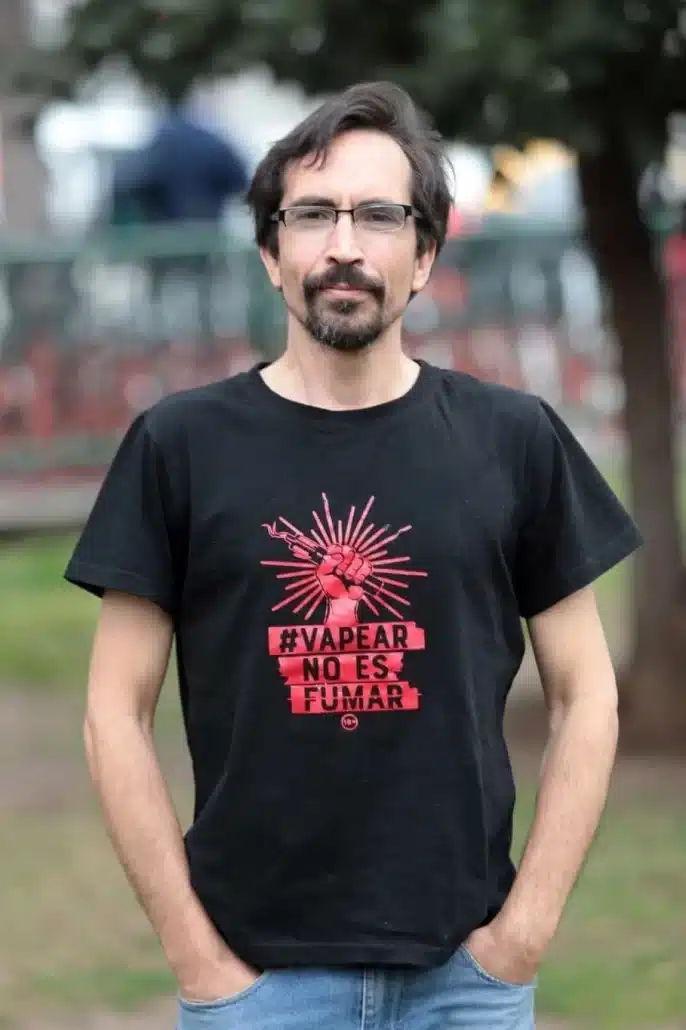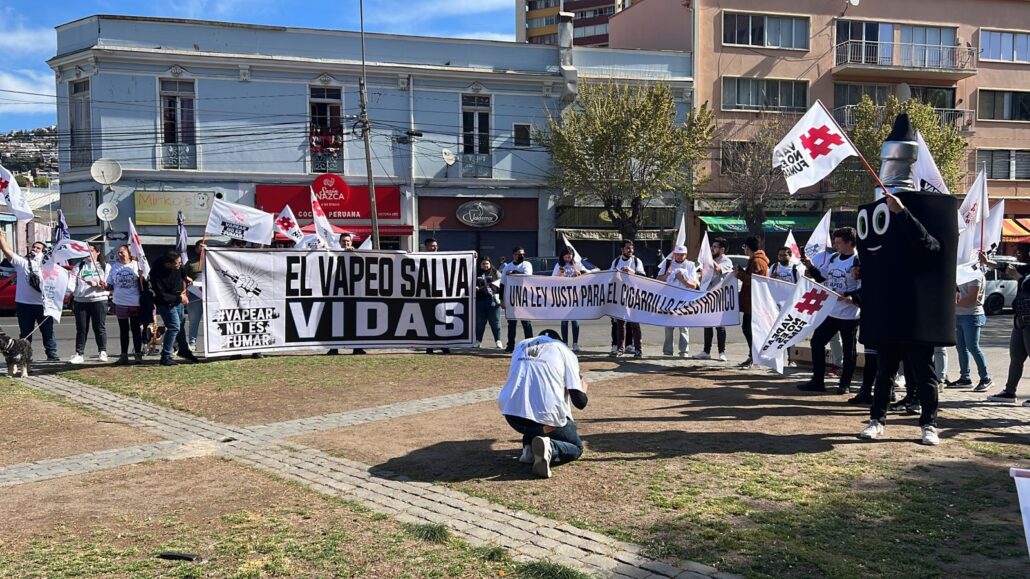In a breath of change, the Chilean congress marked a milestone, igniting hope and positioning the country at the vanguard of vaping regulation, promising a transformative immediate future in the fight against tobacco. This progressive turn in the anti-tobacco strategy has been driven by prominent political figures and the ardent activism of the vaping community, among them Ignacio Leiva, who shared with us some details of this significant transformation.
“Chileans will soon be able to vape safely, without risks because vaping will be regulated in this country.” That was the affirmative message we received in January 2022 from a figure with ties to Chilean political life who preferred not to identify themselves publicly. “I am confident that 2024 will be a different year for the direction of the tobacco issue in our country,” they concluded with a Chilean flag emoji followed by a smiling face.
Back then, the wave of optimism forming at the beginning of the year was also influenced by the atmosphere of renewal. On March 11th, former deputy Gabriel Boric assumed the Chilean presidency, becoming Latin America’s youngest head of state. Boric was precisely the co-author of an advanced parliamentary initiative bill aimed at harm reduction, which sought to regulate electronic cigarettes in a legal environment distinct from tobacco.
But the enthusiasm among harm reduction advocates and the 350,000 Chilean vapers went beyond the election of the “country’s first pro-vaping president.” The excitement was explicitly based on the outcome of the meetings on January 17th and 18th, 2022, in the Juan Lobos Hall, the space of the Health Committee of the Chamber of Deputies.
What seemed evident was that a resolution unanimously approved by the members of the Health Committee would guarantee a clear path towards recognizing vaping as a harm reduction method for tobacco consumption. This resolution denied merging the progressive project presented by Deputy Juan Luis Castro, in which the new president had been one of the co-authors, with another much more conservative one originating from the Senate, which aimed to keep vaping within the tobacco legal lines.
Even in the summer of 2022, harm reduction advocate Ignacio Leiva, president of ASOVAPE Chile and coordinator of the “Vaping is Not Smoking” campaign [Vapear No Es Fumar], did not hide his excitement and celebrated this moment of hope with his thousands of followers on social media. However, the experienced activist, while reaffirming optimism, urged Chilean vapers and supporters to remain vigilant. “Just because we have started moving in a better direction does not mean we should abandon the fight for regulation that is truly appropriate and based on scientific evidence and international experience,” Leiva warned.
Activism and Hope: The Fight for Harm Reduction Recognition in Chilean Legislation
For those closely following global developments in this area, it would not be surprising to anticipate the numerous challenges that would arise given the innovative nature of the legal framework, especially when adopting specific nuances of the tobacco harm reduction paradigm and distinguishing vaping from traditional tobacco products, differentiating between smoking and inhaling.
The main objective was to advocate for the establishment of fair, appropriate, and balanced regulation for vaping, distinguishing it as a unique consumer product with the potential to reduce the risks associated with tobacco consumption. Aware of the prolonged duration of legislative procedures, Leiva anticipated the emergence of significant local and transnational resistances instead of any change in the status quo. He understood that it was essential to remain alert and proactive in the face of these challenges on the battlefield.

Leiva’s concern revolved around the potential legislative treatment of vaping on par with tobacco, considering it a lower-risk product as a substitute for a high-risk one under the same legal and fiscal regulation, which could prove immensely detrimental to Chile. This approach would not only negatively affect the state and the entire socioeconomic framework related to these products but would also only serve to perpetuate the market for combustible tobacco consumers. This situation had the potential to exclusively benefit corporatist neoliberal sectors and the multibillion-dollar pharmaceutical industry, which views vaping as a threat to their lucrative smoking cessation therapies.
Involved in this cause for over a decade, Leiva was fully aware of the inherent difficulties in passing legislation proposing profound changes with wide-ranging socioeconomic consequences in a field still marked by a developing social and political debate. This debate is often saturated with misinformation, false claims, and a refusal to acknowledge solid scientific evidence and prominent empirical experiences, such as those from the United Kingdom or New Zealand. Approaching new legal contours and political and institutional directions requires care, attention, and mobilization.




As Leiva had anticipated, opposing forces quickly manifested themselves. As is often the case, mainly through the moralization of the debate and the promotion of moral panic, centers of power seek to solidify their interests under the guise of justice and legality, thus shaping political and social reality. In this case, they would seek to subordinate public health and collective freedoms to moralistic and corporate interests backed by public power. Thus, within the legal framework, the possibility of equitable regulation for a consumer product that can potentially improve the lives of millions of Chileans would be denied.
“In March 2023, the elections resulted in an almost total renewal in the Health Committee. Most of the committee’s deputies were replaced, forcing us to start the work from scratch. About a month ago, there was an attempt to reintroduce the terminology of ‘electronic cigarette’ into this bill to equate it to combustible cigarettes. Maneuvers were attempted that, in my opinion, lacked decorum,” Leiva revealed to us on that occasion. “During that debate, however, they did not achieve their goal and postponed the vote for the following week. There was intense debate about whether it was possible to proceed and how many votes were needed… The reality is that if it had been voted on at that moment, we would have lost. That’s the truth,” he added.
Faced with this situation, the collective driven by the “Vaping is Not Smoking” campaign mobilized actively. “We managed to send more than 8,800 letters in a week to the 13 deputies who are members of the Health Committee. Additionally, a march was organized for the day of the vote, the following Tuesday of that week. We managed to coordinate the demonstration, and numerous vapers came to protest in front of Congress at the time of the vote, generating considerable noise that the legislators could hear from inside… the truth is that the participants behaved in an exemplary manner… and I filled with pride for the Chileans who mobilized… With all this, we trust that attempts to ban flavors or impose prohibitively high taxes from a commercial standpoint will be discarded.”
“What was remarkable about the situation in Chile was that the sector itself, especially the small industry, the small shopkeeper, was the one clamoring the most for regulation.” Despite the lack of specific regulations, the sector had organized itself in such a way as to prohibit sales to minors and avoid marketing liquids that did not have the backing of recognized international entities. “This meant that the products these shops imported had authorizations from countries like the United States, England, New Zealand, or European Union member states. The shopkeepers demonstrated a strong commitment to market integrity, and it is especially striking that the shops are demanding regulation so vehemently. It was common to hear something like: ‘Please let’s regulate because we need to protect the users.’ Their main goal was to protect their consumers,” Leiva recounted.
Chilean Congress Approves Historic Law
The perseverance of Leiva and hundreds of others has borne fruit. In January 2024, the new law regulating electronic cigarettes was published in bustling Santiago, a metropolis striving to symbolize modernity and progress. This legislation, far from constituting arbitrary limitations, establishes a refined balance between individual freedom and collective well-being, marking a new course toward a more comprehensive and nuanced understanding of vaping.
The new legislation, which takes vaping under its regulatory wing, sets clear and defined standards, distinguishing between smoking and vaping. The adopted law presents an innovative approach that reflects and respects the rising popularity of vaping, particularly among young adults, and introduces regulations to ensure its conscious and responsible use.
For example, it establishes restricting the sale, distribution, or free delivery to minors under 18 as a precautionary measure aimed at safeguarding teenagers while preserving the right of adults to make informed decisions about their lifestyle. In this sense, this legislation emerges as a safety net for public health, paying particular attention to young people, those who still smoke without finding a way to quit the habit, and current users of these devices.
In a gesture of recognition of personal autonomy and the importance of public spaces, the law regulates the use of electronic cigarettes in enclosed areas (except for therapeutic use, when used out of necessity and with a medical prescription). Still, it allows their use in courtyards and open spaces. This reflects an understanding that vaping is an increasingly socially accepted practice and that, unlike traditional cigarette smoke, the exhaled vapor is considerably less invasive.
The legislation also addresses concerns related to emissions from vaping devices. Regulating the substances that can be emitted encourages innovation and the development of safer products. In this way, public health is protected without hindering technological advancement.
Interestingly, electronic cigarettes are equated solely with traditional tobacco products in terms of sales and advertising. This measure sets defined limits for their commercialization and promotes deep reflection on the differences and similarities between these two nicotine consumption modalities. At the same time, it acknowledges the potential of vaping as a less harmful option for those interested in reducing or quitting their tobacco dependence.
Additionally, the packaging of these products, regardless of whether they contain nicotine or not, must include a warning about their addictive potential and specify that their sale is restricted exclusively to individuals over 18 years old. Sales through vending machines are prohibited, and the packaging must provide the following information: manufacturer’s name, place of production, and instructions for assembly, disassembly, and product maintenance. This regulation also applies to the list of ingredients and their concentration, milliliters or milligrams, and warnings for individuals sensitive to nicotine or products containing it. The nicotine concentration in vaping liquids cannot exceed 45 milligrams per milliliter.
The legislation demonstrates the Chilean authorities’ commitment to public health and a more detailed and nuanced understanding of vaping phenomenon. It recognizes both the risks and potential advantages associated with electronic cigarettes, achieving a balance between protecting young people and respecting the autonomy and individual choice of adults.
The law’s implementation will be activated by the publication of a modification to the decree mentioned in Article 6° of Law No. 19.419. This provision requires that all product packaging includes warnings about the health risks associated with their consumption. This modification aims to align the decree with the new regulations introduced by the law. The Ministry of Health has until January 2025 to carry out this adjustment.
Hope Overcame Fear
In the streets of Santiago, where innovation and tradition intertwine in many aspects, this law represents a step forward in Chile’s approach to sensible and balanced regulation. By recognizing and regulating vaping, Chile protects its citizens’ health and embraces a harmonious future where technology and well-being coexist. Moreover, it paves the way for mitigating the severe problems associated with smoking.
Deputy Juan Luis Castro initiated the bill, which aims to legally regulate the sale, advertising, and consumption of electronic cigarettes and separate them from tobacco. A medical doctor and parliamentary representative for the O’Higgins region since 2009, Dr. Juan Luis Castro González (born in 1960) has had a distinguished career in the political, citizen, and labor spheres.
From his leadership in the Young Doctors Association in 1985, through his presidency of the Chilean Medical Association between 2002 and 2008, to his participation on the board of the Latin American Medical Confederation, Castro has left an indelible mark in the field of public health. Despite not responding to our messages to discuss the development of his proposed project, Castro is widely recognized for his significant social contribution to public health. In 1999, he was highlighted by TIME magazine and CNN as one of the “100 Latin American Leaders for the New Millennium”.
The specific regulation proposal for electronic cigarettes, placing them in a legal framework separate from tobacco, spearheaded by Castro and supported by a group of deputies, including the current president of the republic, positions Chile as a leader in Latin America and places it among the select group of exemplary countries in the fight against smoking worldwide.
In Chile, a nation of just over 19 million inhabitants, the prevalence of smoking in the population is declining. However, the country still has 6.7 million smokers, according to the WHO’s Global Report on Trends in Prevalence of Tobacco Smoking 2019. The number of deaths attributable to smoking each year is alarming: more than 12,000 people die annually, according to Tobacco Atlas data not updated to 2015.
According to information released by the Pan American Health Organization (PAHO), smoking is responsible for the death of 52 people a day in Chile, accounting for 16% of total deaths in the country.
Strategies to combat this issue are subject to debate in Chile. PAHO advocates for the effectiveness of restrictive measures from a social and economic standpoint, including the prohibition of tobacco advertising, promotion, and sponsorship, sales to minors, implementing health warnings on packaging, and increasing taxes resulting in higher consumer prices.
Although no concrete data determine the effectiveness of these or other measures, some experts consider, at least from an empirical perspective, that the growing use of vaporizers could significantly reduce smoking in Chile and worldwide.
In Chile, it is possible to purchase nicotine gum, patches, and other nicotine replacement products at any pharmacy without a prescription. Although snus and nicotine pouches are permitted, they are practically unknown and rarely found in conventional stores. The new law also assimilates heated tobacco. On the other hand, vaping, being the most popular reduced-risk product in the country with over 350,000 users, although not prohibited, still lacked adequate regulation.
Until just a few years ago, when it seemed that achieving fairer and more pertinent legislation for vaping in Chile was far off, Dr. Castro’s website featured the slogan “Let hope defeat fear,” a phrase that could symbolize Chile’s progress toward new legislation. This suggests that the fear of vaping, an issue as controversial and complex as the challenge of combating smoking, seems to have been overcome by the country’s authorities.

